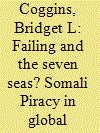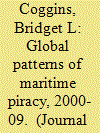|
|
|
Sort Order |
|
|
|
Items / Page
|
|
|
|
|
|
|
| Srl | Item |
| 1 |
ID:
138076


|
|
|
|
|
| Summary/Abstract |
A developed-world consensus ties state failure to new and serious international insecurity. But that conclusion rests upon an uncertain foundation; insights into the nature and intensity of failure-related threats remain tentative and unsystematic. This study begins to remedy the problem, examining the broad relationships between weakness, failure, and terrorism with panel data for 153 countries (1999–2008). I argue that the quantitative literature too often disregards the political context determining terrorism’s use, that terrorism is endogenous to many measures of state failure, and that estimates of the failure-related threat of terrorism are overstated. Consistent with these expectations, I find that most failing and failed states are not predisposed to terrorism. However, among the ‘‘most failed’’ states, those at war or experiencing political collapse are significantly more likely to experience and produce terror. These results refine the relationship between failure and external threat and highlight the importance of terrorism’s macro-level political context.
|
|
|
|
|
|
|
|
|
|
|
|
|
|
|
|
| 2 |
ID:
150481


|
|
|
|
|
| Summary/Abstract |
This article reconciles the conflicting evidence on the relationship between governance and maritime piracy at the macro (state) and micro (sub-state) level using original data (2000–2011) and a study of piracy’s emergence in and around the Horn of Africa. It finds a consistent, positive relationship between state weakness and increased piracy production cross-nationally. However, Somali piracy belies the “anarchy as opportunity” mechanism implied by the large-N study. The pirate industry there received substantial support from local authorities, more consistent with a quadratic, “stability-enabled” argument regarding governance. I conclude that each is half-right. At the macro level, anarchy presents permissive conditions for simple banditry, but limits the potential for robust organized crime unless corruptible sub-state authorities exist and can be co-opted. Policy-wise, efficient pirate deterrence programs should concentrate on regions within failed states with this mix of characteristics. Methodologically, the results point to the limitations of existing metrics of state fragility and governance, and recommend that more nuanced measures be used.
|
|
|
|
|
|
|
|
|
|
|
|
|
|
|
|
| 3 |
ID:
117022


|
|
|
|
|
| Summary/Abstract |
This article introduces the Maritime Piracy Data (MPD), a dataset dedicated to understanding the nature, dynamics, and causes of contemporary piracy and armed robbery against ships. Data on maritime piracy are presented in two formats: an event set and an annual, country-level set. The event data track every maritime piracy attack reported to the International Maritime Bureau's Piracy Reporting Center (IMB/PRC) for a total of 3,413 events between 2000 and 2009. Entries provide event details including date, geo-coded location, attacker nationality, victim nationality, success, vessel type, violence level, loot taken, and/or ransom demanded. The annual data count the number of piracy events emanating from the world's 147 coastal countries over the same decade for a total of 1,470 observations. Entries include country-level information regarding the maritime sector including coastal shipping traffic, coastline length, seaports, distances to major sea lane chokepoints, and merchant marine size. The article describes the main features of the data, provides descriptive statistics, and briefly illustrates their potential utility for research. The MPD has potential utility for scholars examining non-traditional threats generated by non-state actors; for those studying the potential relationships between governance and conflict on land and piracy at sea; and for individuals engaged in policy-relevant analyses evaluating the effectiveness and efficiency of counter-piracy strategies and tactics.
|
|
|
|
|
|
|
|
|
|
|
|
|
|
|
|
|
|
|
|
|